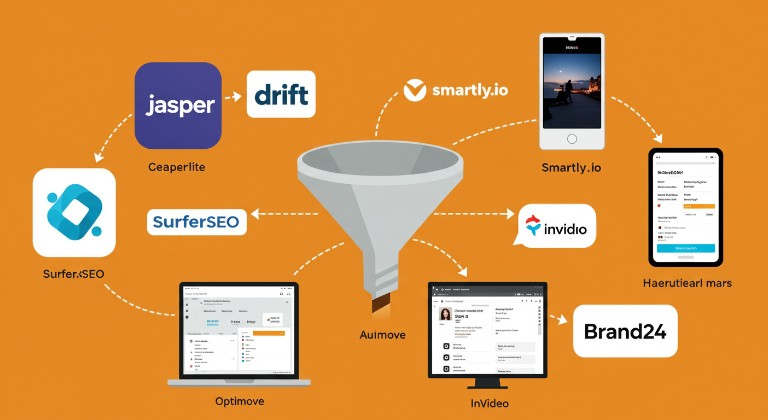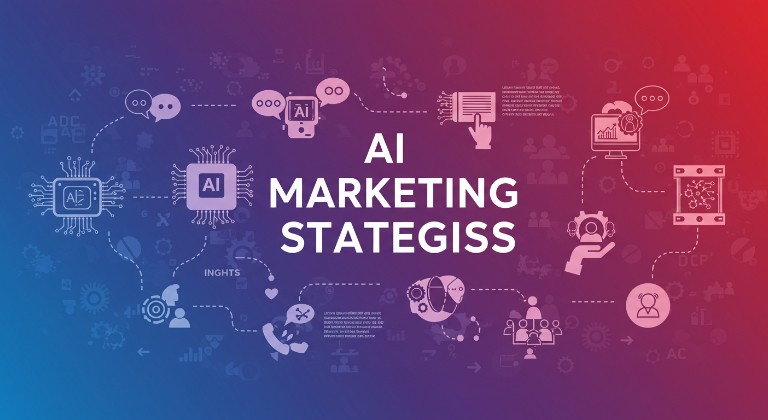Introduction
Imagine a world where your marketing campaigns almost feel like magic—ads that speak directly to individual preferences, content that practically writes itself, and data insights that predict your customer’s next move. Sounds futuristic? It’s happening right now, thanks to AI. In 2025, AI isn’t just a buzzword; it’s the driving force behind some of the most innovative marketing strategies we’ve ever seen. Whether you’re a seasoned marketer or a curious business owner, understanding how AI is transforming the game will put you ahead of the curve.
As businesses across industries continue to adopt AI, the competitive landscape evolves rapidly. Staying informed about these advancements isn’t optional; it’s essential. Let’s dive into how AI is reshaping marketing strategies, what tools you need to stay ahead, and how to navigate ethical considerations in this brave new world.
Table of Contents
Revolutionizing Marketing Strategies in 2025: AI at the Helm
AI is reshaping marketing like never before in 2025. From predictive analytics and hyper-personalization to ethical AI practices, the landscape is evolving rapidly. Discover the top tools, trends, and ethical considerations driving this transformation.
As businesses across industries continue to adopt AI, the competitive landscape evolves rapidly. Staying informed about these advancements isn’t optional; it’s essential. Let’s dive into how AI is reshaping marketing strategies, what tools you need to stay ahead, and how to navigate ethical considerations in this brave new world.
1. How is AI Transforming Marketing Strategies in 2025?
In 2025, AI is no longer just an add-on; it’s at the heart of marketing. Here’s how:
- Predictive Analytics: AI analyzes massive datasets to forecast customer behavior. It’s like having a crystal ball for your marketing campaigns, allowing you to anticipate customer needs and preferences with unmatched accuracy.
- Hyper-Personalization: AI delivers tailored experiences at scale, ensuring each customer feels uniquely valued. From email content to product recommendations, hyper-personalization increases engagement and conversion rates.
- Generative AI in Content Creation: Tools like Jasper and Frase.io help marketers produce high-quality, SEO-optimized content in minutes. This allows businesses to maintain a consistent content pipeline without overburdening creative teams.
- Conversational AI: AI chatbots like Drift engage with customers 24/7, answering queries, guiding decisions, and closing sales. These chatbots mimic human interactions, creating seamless customer experiences.
- Voice Search Optimization: As voice search becomes mainstream, AI ensures your content is optimized to appear in voice search results. This involves rethinking how content is structured and integrating conversational keywords.
Example: Nike’s AI-driven marketing campaigns predict trending products and deliver personalized ads to millions globally, increasing ROI by 40%. By integrating predictive analytics and real-time data, Nike stays ahead of consumer trends and ensures consistent engagement.
2. What Are the Key AI Tools Marketers Should Use in 2025?

Here’s a cheat sheet of must-have AI tools for 2025:
| Tool Name | Description | Key Features |
|---|---|---|
| Jasper | AI-powered content creation tool | Content templates, multilingual support |
| Drift | Conversational AI for real-time engagement | Lead qualification, CRM integration |
| Smartly.io | Social media ad management | Creative automation, predictive analytics |
| SurferSEO | Content optimization for better rankings | Content planner, audit tools |
| Albert.ai | Digital ad optimization assistant | Multi-channel performance tracking |
| Optimove | Customer relationship management with AI | Hyper-segmentation, campaign tracking |
| Invideo | AI-powered video creation tool | Automated editing, text-to-video |
| Brand24 | Media monitoring tool | Sentiment analysis, trend spotting |
Pro Tip: Combine tools like Drift and SurferSEO to optimize both customer interaction and content reach. Tools like Brand24 also help you monitor campaign effectiveness in real time, enabling agile responses.
3. How Does Predictive Analytics Improve Marketing Campaigns?
Predictive analytics uses AI algorithms to:
- Identify high-value customers by analyzing purchase patterns and behaviors.
- Forecast sales trends, allowing marketers to allocate budgets strategically.
- Optimize campaign timing and messaging for maximum impact, ensuring messages reach audiences when they’re most receptive.
Case Study: Starbucks leverages predictive analytics to send personalized offers via its app, boosting customer retention by 30%. By analyzing past purchases and location data, Starbucks creates targeted promotions that feel personal and relevant.
Predictive analytics doesn’t just improve ROI; it builds customer loyalty by consistently delivering value.
4. What Role Does Generative AI Play in Content Creation for Marketing Strategies?
Generative AI takes content creation to a whole new level:
- Faster Production: Tools like MarketMuse draft blogs, emails, and ads in minutes, allowing marketers to focus on strategy rather than execution.
- SEO Optimization: AI ensures content aligns with trending keywords and user intent, increasing visibility and engagement.
- Cost Efficiency: Reduce the need for extensive creative teams by automating repetitive tasks like drafting and editing.
Fun Fact: Over 60% of marketers in 2025 use generative AI to produce at least 50% of their content. This trend underscores the growing reliance on AI to meet the demand for high-quality, consistent content.
Moreover, AI tools are increasingly user-friendly, making them accessible even to small businesses.
5. How Can AI Enhance Customer Personalization and Engagement?
AI takes personalization to the extreme:
- Hyper-Personalized Ads: AI analyzes user behavior to craft ads that resonate deeply. These ads are tailored to individual preferences, ensuring higher click-through and conversion rates.
- Real-Time Interaction: Chatbots and virtual assistants respond instantly, enhancing user experience. They handle everything from answering basic queries to guiding users through complex decisions.
- Data-Driven Insights: AI tracks engagement metrics, refining campaigns dynamically. By analyzing what works and what doesn’t, AI ensures continuous improvement.
Example: Spotify’s AI-driven playlists use listening habits to create personalized mixes, driving user loyalty. This approach not only keeps users engaged but also reinforces brand value by delivering meaningful experiences.
6. What Are the Ethical Considerations When Using AI in Marketing Strategies?
With great power comes great responsibility. Ethical AI practices include:
- Transparency: Clearly disclose AI’s role in decision-making to build trust with your audience.
- Bias Mitigation: Ensure AI models don’t perpetuate discrimination by auditing algorithms regularly.
- Data Privacy: Adhere to regulations like GDPR and CCPA to protect user data. Transparency in data collection and usage is key to maintaining customer trust.
- Sustainability: Use AI responsibly to avoid unnecessary energy consumption, aligning with broader corporate social responsibility goals.
Hot Tip: Use platforms like Optimove to ensure compliance while delivering effective campaigns. Ethical marketing not only protects your brand’s reputation but also strengthens customer relationships.
Conclusion
AI is revolutionizing marketing Strategies in 2025, unlocking possibilities we once only dreamed of. From hyper-personalization and predictive analytics to ethical considerations, the opportunities are endless. But here’s the thing: the earlier you embrace AI, the faster you’ll see results. Businesses that fail to adapt risk being left behind as customer expectations evolve.
Ready to level up your marketing game? Start exploring AI tools today and transform your strategies. The future is here, and it’s waiting for you. Embrace the AI revolution and become a leader in your industry.




